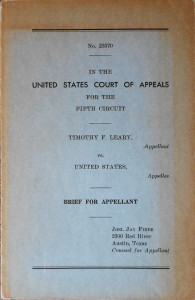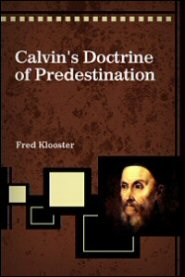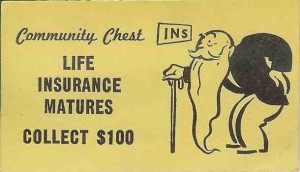 In 2013, a Fifth Circuit panel reversed the NLRB and held that “an employer does not engage in unfair labor practices by maintaining and enforcing an arbitration agreement prohibiting employee class or collective actions and requiring employment-related claims to be resolved through individual arbitration.” D.R. Horton, Inc. v. NLRB, 737 F.3d 344 (5th Cir. 2013). The NLRB, not bound in other jurisdictions by that holding, reaffirmed its original holding in the D.R. Horton case in another matter involving Murphy Oil. Unfortunately for the NLRB, the venue rules for review of its decisions allowed Murphy to appeal to the Fifth Circuit, which – unsurprisingly – again reversed the NLRB. As in the prior case, the Court did not reverse as to a requirement that the employer clarify its documents to be clear that employees were not waiving the right to make Board charges. Murphy Oil USA, Inc. v. NLRB, No. 14-60800 (Oct. 26, 2015).
In 2013, a Fifth Circuit panel reversed the NLRB and held that “an employer does not engage in unfair labor practices by maintaining and enforcing an arbitration agreement prohibiting employee class or collective actions and requiring employment-related claims to be resolved through individual arbitration.” D.R. Horton, Inc. v. NLRB, 737 F.3d 344 (5th Cir. 2013). The NLRB, not bound in other jurisdictions by that holding, reaffirmed its original holding in the D.R. Horton case in another matter involving Murphy Oil. Unfortunately for the NLRB, the venue rules for review of its decisions allowed Murphy to appeal to the Fifth Circuit, which – unsurprisingly – again reversed the NLRB. As in the prior case, the Court did not reverse as to a requirement that the employer clarify its documents to be clear that employees were not waiving the right to make Board charges. Murphy Oil USA, Inc. v. NLRB, No. 14-60800 (Oct. 26, 2015).
Ybarra sued the Dish Network, alleging that he received seven calls from it in violation if the Telephone Consumer Protection Act. The trial court granted partial summary judgment for Ybarra on three of the calls, after which the parties agreed to the dismissal of the remaining claims. Dish appealed, and Ybarra objected because the final judgment did  not reserve Dish’s right to appeal. Distinguishing the much-criticized case of Amstar Corp. v. Southern Pacific, 607 F.2d 1100 (5th Cir. 1979), the Fifth Circuit concluded: “Amstar only precludes the appeal of a claim directly covered by the consent judgment. Here, claims subject the partial summary judgment are independent of the settled claims. The reservation of a right to appeal [in the settlement agreement] was effective.” Ybarra v. Dish Network, No. 14-11316 (Oct. 20, 2015).
not reserve Dish’s right to appeal. Distinguishing the much-criticized case of Amstar Corp. v. Southern Pacific, 607 F.2d 1100 (5th Cir. 1979), the Fifth Circuit concluded: “Amstar only precludes the appeal of a claim directly covered by the consent judgment. Here, claims subject the partial summary judgment are independent of the settled claims. The reservation of a right to appeal [in the settlement agreement] was effective.” Ybarra v. Dish Network, No. 14-11316 (Oct. 20, 2015).
 Guzman sued Celadon Trucking for personal injuries. On May 9, 2011, Celadon’s counsel asked him to undergo an independent medical exam. On May 27, Guzman said in his deposition that he intended to undergo back surgery. Celadon later contended that his surgery constituted spoliation of evidence, and requested an adverse jury instruction. The Fifth Circuit affirmed its denial, noting: “After [Celadon’s counsel] received this disclosure in the deposition, they made no request to be informed of his surgery date, nor did they ask that he delay surgery pending his examination. Only after the examination was completed did [they] assert that the surgery had meaningfully altered evidence. While the timing of Guzman’s surgery may seem strange, there is no evidence to suggest that he acted in a manner intended to deceive [Celadon] or that he undertook the surgery with the intent of destroying or altering evidence.” Guzman v. Jones, No. 15-40007 (Oct. 22, 2015).
Guzman sued Celadon Trucking for personal injuries. On May 9, 2011, Celadon’s counsel asked him to undergo an independent medical exam. On May 27, Guzman said in his deposition that he intended to undergo back surgery. Celadon later contended that his surgery constituted spoliation of evidence, and requested an adverse jury instruction. The Fifth Circuit affirmed its denial, noting: “After [Celadon’s counsel] received this disclosure in the deposition, they made no request to be informed of his surgery date, nor did they ask that he delay surgery pending his examination. Only after the examination was completed did [they] assert that the surgery had meaningfully altered evidence. While the timing of Guzman’s surgery may seem strange, there is no evidence to suggest that he acted in a manner intended to deceive [Celadon] or that he undertook the surgery with the intent of destroying or altering evidence.” Guzman v. Jones, No. 15-40007 (Oct. 22, 2015).
 After losing a state court lawsuit, Martin Resource Management settled with its primary insurer (Zurich) for less than policy limits. Axis, the excess carrier, won summary judgment with the argument that this settlement did not trigger coverage, and the Fifth Circuit affirmed. The Axis policy said: “The Insurance afforded under this Policy shall apply only after all applicable Underlying Insurance . . . has been exhausted by actual payment under such Underlying Insurance[.]” Martin Resource Management Corp. v. Axis Ins. Co., No. 14-40512 (Oct. 21, 2015) (applying Citigroup, Inc. v. Federal Ins. Co., 649 F.3d 367, 371-73 (5th Cir. 2011)).
After losing a state court lawsuit, Martin Resource Management settled with its primary insurer (Zurich) for less than policy limits. Axis, the excess carrier, won summary judgment with the argument that this settlement did not trigger coverage, and the Fifth Circuit affirmed. The Axis policy said: “The Insurance afforded under this Policy shall apply only after all applicable Underlying Insurance . . . has been exhausted by actual payment under such Underlying Insurance[.]” Martin Resource Management Corp. v. Axis Ins. Co., No. 14-40512 (Oct. 21, 2015) (applying Citigroup, Inc. v. Federal Ins. Co., 649 F.3d 367, 371-73 (5th Cir. 2011)).
 Hilda Garza sued Starr County for wrongfully discharging her as a county attorney, in retaliation for announcing her candidacy for the local school board, and she won a $1.4 million verdict for front pay at trial. The district court set aside the verdict as advisory, reasoning that it went to an issue of equitable relief, and allowed the County to offer her reinstatement as an alternative remedy. The Fifth Circuit reversed. While Fed. R. Civ. P. 39(c) allows an advisory jury, it does not apply when: (1) the parties voluntarily submit an issue to a jury without formal objection, and (2) the district court does not announce in advance that the verdict is advisory. Garza v. Starr County, Texas, No. 14-41343 (Oct. 20, 2015, unpublished) (citing, inter alia, Alcatel USA, Inc. v. DGI Techs., Inc., 166 F.3d 772 (5th Cir. 1999)). (The County also challenged the award as excessive; while noting that the “more prudent course” would have been for the County to cross-appeal, the Court allowed the County to raise that issue on remand — although noting that the County’s lack of earlier objections would limit what it could raise.)
Hilda Garza sued Starr County for wrongfully discharging her as a county attorney, in retaliation for announcing her candidacy for the local school board, and she won a $1.4 million verdict for front pay at trial. The district court set aside the verdict as advisory, reasoning that it went to an issue of equitable relief, and allowed the County to offer her reinstatement as an alternative remedy. The Fifth Circuit reversed. While Fed. R. Civ. P. 39(c) allows an advisory jury, it does not apply when: (1) the parties voluntarily submit an issue to a jury without formal objection, and (2) the district court does not announce in advance that the verdict is advisory. Garza v. Starr County, Texas, No. 14-41343 (Oct. 20, 2015, unpublished) (citing, inter alia, Alcatel USA, Inc. v. DGI Techs., Inc., 166 F.3d 772 (5th Cir. 1999)). (The County also challenged the award as excessive; while noting that the “more prudent course” would have been for the County to cross-appeal, the Court allowed the County to raise that issue on remand — although noting that the County’s lack of earlier objections would limit what it could raise.)
 The defendants in Bartel v. Alcoa Steamship Co. sought to remove three Jones Act cases to federal court under the Federal Officer Removal Statute, 28 U.S.C. § 1442(a)(1). While each of the cases involved a United States Naval Ship (one owned by the Navy but operated by civil contractors), “no evidence show[ed] that the government actually exercised continuing oversight over operations aboard ship,” meaning that “the Federal Officer Defendants operated the vessels in a largely independent fashion and, at a minimum, were free to adopt the safety measures the plaintiffs now allege would have prevented their injuries.” Accordingly, the Fifth Circuit affirmed the remand of the cases. No. 15-30004 (Oct. 19, 2015). [As a procedural note, those defendants had already been dismissed, but their dismissal did not affect the analysis of whether removal was proper at the time it occurred.]
The defendants in Bartel v. Alcoa Steamship Co. sought to remove three Jones Act cases to federal court under the Federal Officer Removal Statute, 28 U.S.C. § 1442(a)(1). While each of the cases involved a United States Naval Ship (one owned by the Navy but operated by civil contractors), “no evidence show[ed] that the government actually exercised continuing oversight over operations aboard ship,” meaning that “the Federal Officer Defendants operated the vessels in a largely independent fashion and, at a minimum, were free to adopt the safety measures the plaintiffs now allege would have prevented their injuries.” Accordingly, the Fifth Circuit affirmed the remand of the cases. No. 15-30004 (Oct. 19, 2015). [As a procedural note, those defendants had already been dismissed, but their dismissal did not affect the analysis of whether removal was proper at the time it occurred.]
 In a case that has now gone en banc, the plaintiffs in Torres v. S.G.E. Management, 805 F.3d 145 (5th Cir. 2015), alleged that they were victims of an alleged pyramid scheme about a multi-level marketing program to sell electricity. The district court certified a class, acknowledging that the plaintiffs could not show a common misrepresentation, but concluding that they could show a common failure to disclose the illegality of such a scheme. In other words, “Because it can rationally be assumed (at least without any contravening evidence) that the legality of the Ignite program was a bedrock assumption of every class member, a showing that the program was actually a facially illegal pyramid scheme would provide the necessary proximate cause.”
In a case that has now gone en banc, the plaintiffs in Torres v. S.G.E. Management, 805 F.3d 145 (5th Cir. 2015), alleged that they were victims of an alleged pyramid scheme about a multi-level marketing program to sell electricity. The district court certified a class, acknowledging that the plaintiffs could not show a common misrepresentation, but concluding that they could show a common failure to disclose the illegality of such a scheme. In other words, “Because it can rationally be assumed (at least without any contravening evidence) that the legality of the Ignite program was a bedrock assumption of every class member, a showing that the program was actually a facially illegal pyramid scheme would provide the necessary proximate cause.”
The Fifth Circuit disagreed: “[A]n investor could reasonably choose to knowingly invest in a pyramid scheme in the hope that they would make money. As we have already explained, a pyramid scheme provides an opportunity for those at the top of the pyramid to profit from their investments. While many of the Plaintiffs might have decided to invest in the scheme in the belief that it was legal, it is equally possible that many of the Plaintiffs chose to invest in the scheme in the belief that, legal or illegal, it provided them with an opportunity to make money.” Accordingly, because Plaintiffs had to establish reliance with individualized proof, the Court decertified the class.
A detailed dissent warned: “By erecting this barrier to class certification based on nothing more than the theoretical possibility of prior knowledge of illegality, the panel majority creates an insurmountable barrier in this circuit to future class certification of cases that claim the presence of an illegal pyramid scheme. But, even worse, because individuals who are duped into joining such schemes uniformly invest relatively few dollars, none will possibly be able to afford to litigate their individual claims separately. Absent the availability of a class action, there simply will be no possibility of court challenges to such pyramid schemes.”
 In a bankruptcy appeal to district court, the appellant’s brief was due on November 4. It did not file; the appellee moved to dismiss a month later, and the appellant was denied leave to file late. The Fifth Circuit found no abuse of discretion in that decision, looking to the factors about leave for late filings identified in Salts v. Epps, 676 F.3d 468, 474 & n.13 (5th Cir. 2012). The Court noted: “In the order granting Tarbox’s motion to dismiss, the district court found: 1) ‘the delay of over one month has prejudiced Appellee’ in its state court suit against [Appellant]; 2) the ‘thirty-four day delay’ ‘is substantial, and could have been easily avoided through basic diligence’; 3) ‘Appellant’s failure to exercise diligence in filing and pursuing its appeal was the sole reason for the delay’; and 4) ‘“Appellant has not shown good cause to excuse the late filing.” Neurology & Neurophysiology Assocs., P.A. v. Tarbox, No. 15-50105 (Oct. 15, 2015, unpublished).
In a bankruptcy appeal to district court, the appellant’s brief was due on November 4. It did not file; the appellee moved to dismiss a month later, and the appellant was denied leave to file late. The Fifth Circuit found no abuse of discretion in that decision, looking to the factors about leave for late filings identified in Salts v. Epps, 676 F.3d 468, 474 & n.13 (5th Cir. 2012). The Court noted: “In the order granting Tarbox’s motion to dismiss, the district court found: 1) ‘the delay of over one month has prejudiced Appellee’ in its state court suit against [Appellant]; 2) the ‘thirty-four day delay’ ‘is substantial, and could have been easily avoided through basic diligence’; 3) ‘Appellant’s failure to exercise diligence in filing and pursuing its appeal was the sole reason for the delay’; and 4) ‘“Appellant has not shown good cause to excuse the late filing.” Neurology & Neurophysiology Assocs., P.A. v. Tarbox, No. 15-50105 (Oct. 15, 2015, unpublished).
 Eric Eddy alleged injury from a printing press. The Fifth Circuit affirmed for lack of personal jurisdiction in Texas, holding:
Eric Eddy alleged injury from a printing press. The Fifth Circuit affirmed for lack of personal jurisdiction in Texas, holding:
1. “Once the press was installed in Mississippi, it exited the stream of commerce because the Mississippi buyer was a consumer of the product, not a distributor or retailer.” After that point, the movement of the press “was the result of ‘fortuitous’ and ‘attenuated’ acts of third parties[.]” (The last sentence echoes the Supreme Court’s recent emphasis of this general concept in Walden v. Fiore, 134 S. Ct. 1115 (2014)).
2. While spare parts for the press were shipped by the defendant to Texas, no evidence showed that those parts contributed to the plaintiff’s injury, and the defendant “introduced uncontroverted evidence establishing that the drive shaft Eddy alleged caused his injury was not, and could not have been, the same shaft that was shipped with the spare parts.”
Eddy v. The Printers House (P) Limited, No. 15-10370 (Oct. 2, 2015, unpublished).
 A dispute about the scope a “Chinese drywall” settlement illustrates the operation of complex class settlements. Defendants settled with a broadly-defined group of claimants about defective drywall, but limited to claims involving “Affected Property.” Defendants sought to enjoin a case by a class member who alleged that his condominium – which did not have Chinese drywall – had lost value because of its association with a neighboring property that did have defective Chinese drywall (also called or a “stigma” claim). The district court denied the request and the Fifth Circuit affirmed. Mangiarelli v. Sixty-Fifth and One, LLC, No. 14-31355 (Oct. 2, 2015, unpublished). The Court distinguished between the situation when “individuals [are] ‘class members’ under a settlement agreement, yet [are] barred from recovery under the terms of that agreement” from this situation, where the plaintiff “was never entitled to a benefit under the . . . agreements in exchange for releasing his stigma claims.”
A dispute about the scope a “Chinese drywall” settlement illustrates the operation of complex class settlements. Defendants settled with a broadly-defined group of claimants about defective drywall, but limited to claims involving “Affected Property.” Defendants sought to enjoin a case by a class member who alleged that his condominium – which did not have Chinese drywall – had lost value because of its association with a neighboring property that did have defective Chinese drywall (also called or a “stigma” claim). The district court denied the request and the Fifth Circuit affirmed. Mangiarelli v. Sixty-Fifth and One, LLC, No. 14-31355 (Oct. 2, 2015, unpublished). The Court distinguished between the situation when “individuals [are] ‘class members’ under a settlement agreement, yet [are] barred from recovery under the terms of that agreement” from this situation, where the plaintiff “was never entitled to a benefit under the . . . agreements in exchange for releasing his stigma claims.”
 NiGen alleged that the Texas Attorney General systematically sent harassing letters to retailers, warning against stocking its “amino acid building blocks” product. At least as to future activity by the AG, the Fifth Circuit found that NiGen had standing to complain and could allege a claim for injunctive relief to enforce federal law under Ex parte Young: “None of these cases sought, like NiGen’s, to lift a yoke of alleged unconstitutional conduct from the plaintiff’s own shoulders.” NiGen Biotech, LLC v. Paxton, No. 14-10923 (Sept. 23, 2015).
NiGen alleged that the Texas Attorney General systematically sent harassing letters to retailers, warning against stocking its “amino acid building blocks” product. At least as to future activity by the AG, the Fifth Circuit found that NiGen had standing to complain and could allege a claim for injunctive relief to enforce federal law under Ex parte Young: “None of these cases sought, like NiGen’s, to lift a yoke of alleged unconstitutional conduct from the plaintiff’s own shoulders.” NiGen Biotech, LLC v. Paxton, No. 14-10923 (Sept. 23, 2015).
 The case of Ferguson v. Bank of New York reminds of two basic principles in the area of mortgage servicing litigation: (1) MERS can be named as a beneficiary under a deed of trust; and (2) a borrower does not ordinarily have standing to enforce the terms of a pooling & servicing agreement. The Court sidestepped an issue of whether the Texas fraudulent lien statute could apply if a lender simply transferred a lien as opposed to creating it. No. 14-20585 (Oct. 1, 2015).
The case of Ferguson v. Bank of New York reminds of two basic principles in the area of mortgage servicing litigation: (1) MERS can be named as a beneficiary under a deed of trust; and (2) a borrower does not ordinarily have standing to enforce the terms of a pooling & servicing agreement. The Court sidestepped an issue of whether the Texas fraudulent lien statute could apply if a lender simply transferred a lien as opposed to creating it. No. 14-20585 (Oct. 1, 2015).
 The Fifth Circuit reversed a ruling that declined to enforce a Moroccan judgment in the case of Dejoria v. Maghreb Petroleum Exploration, S.A., No. 14-51022 (Sept. 30, 2015). Acknowledging that the Moroccan court system has been criticized for a lack of independence from that country’s king, the Court concluded that “we cannot agree that the Moroccan judicial system lacks sufficient independence such that fair litigation in Morocco is impossible,” and that the defendant had not shown that “Morocco would not recognize an otherwise enforceable foreign judgment only because the judgment was rendered in Texas.” The Court distinguished other cases involving Iranian “revolutionary courts” and the Liberian court system during that country’s civil war, saying they “exemplify how a foreign judicial system can be so fundamentally flawed as to offend basic notions of fairness.”
The Fifth Circuit reversed a ruling that declined to enforce a Moroccan judgment in the case of Dejoria v. Maghreb Petroleum Exploration, S.A., No. 14-51022 (Sept. 30, 2015). Acknowledging that the Moroccan court system has been criticized for a lack of independence from that country’s king, the Court concluded that “we cannot agree that the Moroccan judicial system lacks sufficient independence such that fair litigation in Morocco is impossible,” and that the defendant had not shown that “Morocco would not recognize an otherwise enforceable foreign judgment only because the judgment was rendered in Texas.” The Court distinguished other cases involving Iranian “revolutionary courts” and the Liberian court system during that country’s civil war, saying they “exemplify how a foreign judicial system can be so fundamentally flawed as to offend basic notions of fairness.”
 Underwood Cotton sued Clark Freight Lines, seeking a declaratory judgment about alleged overcharges on invoices for shipping containers. Clark removed the case on the basis of complete preemption, and counterclaimed for payment of the invoices. The district court dismissed the counterclaim and remanded, finding that federal jurisdiction had not been established over the declaratory judgment or the “converse breach of contract action” brought by Clark. The Fifth Circuit dismissed the resulting appeal, finding: “[T]he dismissal of the counterclaims did not precede the remand in logic and fact. Dismissing the counterclaims did not deprive the court of subject-matter jurisdiction; the district court ruled it never had jurisdiction to begin with.” Underwood Cotton Co. v. Clark Freight Lines, Inc., No. 14-11327 (Sept. 28, 2015, unpublished). The Court noted that the counterclaims could proceed in state court notwithstanding the district court’s jurisdictional ruling.
Underwood Cotton sued Clark Freight Lines, seeking a declaratory judgment about alleged overcharges on invoices for shipping containers. Clark removed the case on the basis of complete preemption, and counterclaimed for payment of the invoices. The district court dismissed the counterclaim and remanded, finding that federal jurisdiction had not been established over the declaratory judgment or the “converse breach of contract action” brought by Clark. The Fifth Circuit dismissed the resulting appeal, finding: “[T]he dismissal of the counterclaims did not precede the remand in logic and fact. Dismissing the counterclaims did not deprive the court of subject-matter jurisdiction; the district court ruled it never had jurisdiction to begin with.” Underwood Cotton Co. v. Clark Freight Lines, Inc., No. 14-11327 (Sept. 28, 2015, unpublished). The Court noted that the counterclaims could proceed in state court notwithstanding the district court’s jurisdictional ruling.
 The Fifth Circuit reversed the dismissal of misrepresentation claims about the sale of a house with mold problems, finding that this disclaimer was not dispositive: “Buyer is hereby advised that mold and/or other microscopic organisms may exist at the property known as 1425 MAGNOLIA RIDGE, BOSSIER CITY, LA, 71112. . . . Buyer acknowledges and agrees to accept full responsibility/risk for any matters that may result from microscopic organisms and/or mold and to hold harmless, release, and indemnify Seller and Seller’s managing agents from any liability/recourse/damages (financial or otherwise). Buyer understands that Seller has taken no action to remediate mold. . . . The purpose of this disclaimer is to put Buyers on notice to conduct their own due diligence regarding this matter using appropriate, qualified experts[.]” Jones v. Wells Fargo Bank, No. 15-30031 (Sept. 28, 2015, unpublished).
The Fifth Circuit reversed the dismissal of misrepresentation claims about the sale of a house with mold problems, finding that this disclaimer was not dispositive: “Buyer is hereby advised that mold and/or other microscopic organisms may exist at the property known as 1425 MAGNOLIA RIDGE, BOSSIER CITY, LA, 71112. . . . Buyer acknowledges and agrees to accept full responsibility/risk for any matters that may result from microscopic organisms and/or mold and to hold harmless, release, and indemnify Seller and Seller’s managing agents from any liability/recourse/damages (financial or otherwise). Buyer understands that Seller has taken no action to remediate mold. . . . The purpose of this disclaimer is to put Buyers on notice to conduct their own due diligence regarding this matter using appropriate, qualified experts[.]” Jones v. Wells Fargo Bank, No. 15-30031 (Sept. 28, 2015, unpublished).
The district court removed a bankruptcy trustee after he sought to bill a family trip to New Orleans to the estate, noting two past situations where the court had an issue with the trustee’s practices. The Fifth Circuit affirmed, rejecting several challenges to that ruling based primarily on the consideration of the past situations, holding: “The district courts and in turn the bankruptcy courts are the keepers of the temple. These courts rely on the bar to abide by its strict rules and norms of conduct. Bankruptcy practice presents many tasks attended and girded by strict identity of duty and diligence by its officers. The courts below were only minding their role: not to end, but to redirect a distinguished presence at the bar, and to give sustenance to necessarily demanding norms of practice. That this is expected does not diminish its importance.” Smith v. Robbins, No. 14-20588 (Sept. 25, 2015).
Susan Rothkamm sued for wrongful levy, after the IRS seized a CD in her name to satisfy a tax liability of her husband. The Fifth Circuit reversed the dismissal of her claim, finding that she had standing as a “taxpayer” under the broad definition of 7701 of the Internal Revenue Code: “The term ‘taxpayer’ means any person subject to any internal revenue tax.” The Court also found that limitations was tolled during the pendency of her application for a Taxpayer Assistance Order, and that the IRS did not have discretion to affect the length of that tolling period. Rothkamm v. United States, No. 14-31164 (Sept. 21, 2015). A dissent warned: “I dissent from the majority’s newly minted tolling rule. While this creativity is driven by a desire to achieve fairness, it suffers the vice common to such endeavors – it does the opposite by disrupting a carefully structured regime for the resolution of disputes between the IRS and property owners.”
 Myers slipped in the shower while working aboard a drilling rig in the Gulf of Mexico. In an echo of Blanton v. Newton Associates (a recent employment cases that turned on a prompt investigation into the facts), the rig operator quickly obtained a statement from Myers that said: “When getting out of shower, my shower shoe on left foot broke causing my left foot to slip and twist and resulted in falling out of shower.” When Myers took an inconsistent position in trial (arguing that he fell because of inadequate rails and mats), this statement was key to affirmance of a defense judgment. The Fifth Circuit also rejected an argument about the trial court’s review of the evidence: “Myers does not allege that the court did not see the flip flops; instead, he appears to object to the court’s failure to inspect them more closely. . . . When physical evidence is introduced at a bench trial, neither caselaw nor common sense establishes a minimum distance the judge must be from that evidence before the judge’s obligation to consider the evidence is satisfied.” Myers v. Hercules Offshore Services, No. 15-30020 (Sept. 25, 2015, unpublished).
Myers slipped in the shower while working aboard a drilling rig in the Gulf of Mexico. In an echo of Blanton v. Newton Associates (a recent employment cases that turned on a prompt investigation into the facts), the rig operator quickly obtained a statement from Myers that said: “When getting out of shower, my shower shoe on left foot broke causing my left foot to slip and twist and resulted in falling out of shower.” When Myers took an inconsistent position in trial (arguing that he fell because of inadequate rails and mats), this statement was key to affirmance of a defense judgment. The Fifth Circuit also rejected an argument about the trial court’s review of the evidence: “Myers does not allege that the court did not see the flip flops; instead, he appears to object to the court’s failure to inspect them more closely. . . . When physical evidence is introduced at a bench trial, neither caselaw nor common sense establishes a minimum distance the judge must be from that evidence before the judge’s obligation to consider the evidence is satisfied.” Myers v. Hercules Offshore Services, No. 15-30020 (Sept. 25, 2015, unpublished).
 Sanger Insurance Agency alleged that HUB International violated the antitrust laws to keep it from selling professional liability insurance to veterinarians. The Fifth Circuit reversed the dismissal of Sanger’s claims with two holdings. The Court first found that while Sanger was new to this business, it had done enough to establish antitrust standing, especially since Sanger alleged that the defendants’ anticompetitive activity had hurt its ability to enter the market: “[B]y pursuing a deal with a professional association of veterinarians and even achieving some success in its initial efforts, Sanger went beyond ‘the most basic preparatory steps’ that we require of nascent competitors.” While then remanding as to other claims, the Court found Sanger’s federal antitrust claims “reverse-preempted” under the McCarran-Ferguson Act.: “Assuming that HUB is engaged in exclusive dealing that prevents the insurers from writing insurance for other group plans, that conduct fortifies the Program HUB operates through the American Veterinary Medical Association. Keeping a large, geographically and professionally diverse pool of veterinarians in the Program—including significant numbers of small- animal, large-animal, mixed, and equine veterinarians—spreads risk.” Sanger Insurance Agency v. HUB Int’l, Inc, No. 14-40854 (Sept. 23, 2015).
Sanger Insurance Agency alleged that HUB International violated the antitrust laws to keep it from selling professional liability insurance to veterinarians. The Fifth Circuit reversed the dismissal of Sanger’s claims with two holdings. The Court first found that while Sanger was new to this business, it had done enough to establish antitrust standing, especially since Sanger alleged that the defendants’ anticompetitive activity had hurt its ability to enter the market: “[B]y pursuing a deal with a professional association of veterinarians and even achieving some success in its initial efforts, Sanger went beyond ‘the most basic preparatory steps’ that we require of nascent competitors.” While then remanding as to other claims, the Court found Sanger’s federal antitrust claims “reverse-preempted” under the McCarran-Ferguson Act.: “Assuming that HUB is engaged in exclusive dealing that prevents the insurers from writing insurance for other group plans, that conduct fortifies the Program HUB operates through the American Veterinary Medical Association. Keeping a large, geographically and professionally diverse pool of veterinarians in the Program—including significant numbers of small- animal, large-animal, mixed, and equine veterinarians—spreads risk.” Sanger Insurance Agency v. HUB Int’l, Inc, No. 14-40854 (Sept. 23, 2015).
 First Metropolitan Church sued Genesis Group, a company that helps churches obtain mortgage refinancing. The Fifth Circuit affirmed dismissal for lack of personal jurisdiction in a short opinion, echoing its recognition of recent Supreme Court opinions in Monkton Ins. Servs. v. Ritter, 768 F.3d 429 (5th Cir. 2014). An interactive website, even one that lists Texas business references, does not create general jurisdiction, and contracting with a Texas resident does not create jurisdiction if it does not “contemplate a long-term relationship with . . . continuing obligations and wide-reaching contacts.” First Metropolitan Church of Houston v. Genesis Group, No. 15-20186 (Sept. 17, 2015, unpublished)
First Metropolitan Church sued Genesis Group, a company that helps churches obtain mortgage refinancing. The Fifth Circuit affirmed dismissal for lack of personal jurisdiction in a short opinion, echoing its recognition of recent Supreme Court opinions in Monkton Ins. Servs. v. Ritter, 768 F.3d 429 (5th Cir. 2014). An interactive website, even one that lists Texas business references, does not create general jurisdiction, and contracting with a Texas resident does not create jurisdiction if it does not “contemplate a long-term relationship with . . . continuing obligations and wide-reaching contacts.” First Metropolitan Church of Houston v. Genesis Group, No. 15-20186 (Sept. 17, 2015, unpublished)
 Allstate sued a group of chiropractic clinics and law firms under RICO, alleging that they conspired to send them fraudulent bills for unnecessary services. Allstate won a 7-figure judgment at trial. The Fifth Circuit affirmed, reviewing some basic RICO principles after recent Supreme Court rulings:
Allstate sued a group of chiropractic clinics and law firms under RICO, alleging that they conspired to send them fraudulent bills for unnecessary services. Allstate won a 7-figure judgment at trial. The Fifth Circuit affirmed, reviewing some basic RICO principles after recent Supreme Court rulings:
- “Although the evidence proving the two will sometimes coalesce, the government still has to satisfy the organizational metric of the enterprise (including continuity and common purpose) and the statutorily enumerated predicated offenses. There is thus no impermissible collapsing of the distinction between the enterprise and the pattern of racketeering.” (applying a plain error standard of review)
- “[M]ail fraud and its place in RICO framework are different from a case alleging common-law fraud, and one of the differences is the lack of a reliance requirement.” Here, “[r]egardless of how proximate cause is sliced, Allstate proved it. There is no plausible argument that the insurers were unforeseeable victims or otherwise wronged by the caprice of chance.”
- As to damages, distinguishing a similar case that found inadequate proof that all paid-for services were unnecessary, the Court held: “There is no such deficiency here. The court instructed the jury, in awarding damages, to distinguish between the portions of the bills generated for unreasonable or unnecessary services and those not generated for those services. Allstate had experts examine all of the files, not just a representative sample, and one of those witnesses testified that Allstate had internally itemized the elements of each settlement.”
Allstate Ins. Co. v. Plambeck, No. 14-10574 (Sept. 17, 2015).
 The Fifth Circuit issued a revised opinon in Kovaly v. Wal-Mart Stores, No. 14-20697 (Sept. 22, 2015, unpublished). The new opinion reaches the same result — reversal of the Daubert exclusion of an expert about the standard of care for a Texas pharmacist asked to issue a 72-hour emergency prescription. It provides more detail about the expert’s analysis, eliminating some uncertainty in the original opinion about the role of Texas regulations in the expert’s work: “Brooke specifically analyzed how the various regulations overlap and how the history of the regulations led to the codification of particular exceptions but not others. He explained that his opinion was based not only on the regulations but also on their history, accepted practice, and pharmacist training.”
The Fifth Circuit issued a revised opinon in Kovaly v. Wal-Mart Stores, No. 14-20697 (Sept. 22, 2015, unpublished). The new opinion reaches the same result — reversal of the Daubert exclusion of an expert about the standard of care for a Texas pharmacist asked to issue a 72-hour emergency prescription. It provides more detail about the expert’s analysis, eliminating some uncertainty in the original opinion about the role of Texas regulations in the expert’s work: “Brooke specifically analyzed how the various regulations overlap and how the history of the regulations led to the codification of particular exceptions but not others. He explained that his opinion was based not only on the regulations but also on their history, accepted practice, and pharmacist training.”
 An appeal in a dispute between the Iraqi oil ministry and the Kurdistan governmental authority (“KRG”) ended in dismissal for mootness, after the tanker with the relevant oil “weighed anchor . . and . . . sailed to Ahkelon, Israel[.]” (The ship at issue, UNITED KALAVRYTA, appears at right and is presently underway in the Black Sea.) The Fifth Circuit rejected several arguments by the KRG that the dispute remained live, including:
An appeal in a dispute between the Iraqi oil ministry and the Kurdistan governmental authority (“KRG”) ended in dismissal for mootness, after the tanker with the relevant oil “weighed anchor . . and . . . sailed to Ahkelon, Israel[.]” (The ship at issue, UNITED KALAVRYTA, appears at right and is presently underway in the Black Sea.) The Fifth Circuit rejected several arguments by the KRG that the dispute remained live, including:
- Any request in the complaint for a declaratory judgment was merely ancillary to the claim to recover the tanker under admiralty law;
- No claim for interest remained because the Ministry sought to recover the oil, not money damages;
- The “such other and further relief” clause at the end of the complaint was not a pleading for money damages; and
- “[H]ypothetical future shipments do not prevent the dispute regarding the Cargo at issue here from being moot.”
The Court also rejected a request by the  KRG for vacatur of the lower court’s decision, noting in particular that “the KRG mooted this appeal through its voluntary decision to discharge the Cargo in Israel. In so doing, the KRG severely weakened its argument for equitable relief.” Ministry of Oil of the Republic of Iraq v. Kurdistan Region of Iraq, No. 15-40062 (Sept. 21, 2015, unpublished).
KRG for vacatur of the lower court’s decision, noting in particular that “the KRG mooted this appeal through its voluntary decision to discharge the Cargo in Israel. In so doing, the KRG severely weakened its argument for equitable relief.” Ministry of Oil of the Republic of Iraq v. Kurdistan Region of Iraq, No. 15-40062 (Sept. 21, 2015, unpublished).
 McGowan successfully sued his employer, Tractor Supply Co., for over $8 million in damages after a severe workplace injury. In the meantime, TSC’s umbrella carrier sued TSC and another carrier for a declaration about coverage obligations. The district court dismissed for lack of standing, and pursuant to its discretion under the Declaratory Judgment Act. The Fifth Circuit reversed; its principal holdings were: (1) under Texas insurance law, this sort of suit is justiciable after a liability determination at trial, and does not require exhaustion of appellate remedies; (2) the issues and parties were different in the two actions; and (3) the declaratory judgment suit was filed after the state case and otherwise showed “no indication of procedural fencing.” Ironshore Specialty Ins. Co. v. Tractor Supply Co. 14-51164 (Aug. 25, 2015, unpublished)
McGowan successfully sued his employer, Tractor Supply Co., for over $8 million in damages after a severe workplace injury. In the meantime, TSC’s umbrella carrier sued TSC and another carrier for a declaration about coverage obligations. The district court dismissed for lack of standing, and pursuant to its discretion under the Declaratory Judgment Act. The Fifth Circuit reversed; its principal holdings were: (1) under Texas insurance law, this sort of suit is justiciable after a liability determination at trial, and does not require exhaustion of appellate remedies; (2) the issues and parties were different in the two actions; and (3) the declaratory judgment suit was filed after the state case and otherwise showed “no indication of procedural fencing.” Ironshore Specialty Ins. Co. v. Tractor Supply Co. 14-51164 (Aug. 25, 2015, unpublished)
 A security company required that its employees travel to a designated break location at lunchtime, substantially eating into their 30-minute lunch break. The Fifth Circuit reversed summary judgment for the company on FLSA claims, reasoning: “Unlike a requirement that the employee stay in uniform, or even one that may result in the employee having to perform a duty on rare occasions, a jury could find that preventing the employee from eating—ostensibly the main purpose of the break—for twelve out of thirty minutes during every break is a meaningful limitation on the employee’s freedom. The travel obligation thus cannot be deemed a mere ‘inconvenience’ as a matter of law.” Naylor v. Securiguard, Inc., No. 14-60637 (Sept. 15, 2015). Whether the “40 percent rule” carries over to other areas of summary judgment practice remains to be seen, but Naylor still stands as a cogent and highly readable review of a basic part of the modern workplace.
A security company required that its employees travel to a designated break location at lunchtime, substantially eating into their 30-minute lunch break. The Fifth Circuit reversed summary judgment for the company on FLSA claims, reasoning: “Unlike a requirement that the employee stay in uniform, or even one that may result in the employee having to perform a duty on rare occasions, a jury could find that preventing the employee from eating—ostensibly the main purpose of the break—for twelve out of thirty minutes during every break is a meaningful limitation on the employee’s freedom. The travel obligation thus cannot be deemed a mere ‘inconvenience’ as a matter of law.” Naylor v. Securiguard, Inc., No. 14-60637 (Sept. 15, 2015). Whether the “40 percent rule” carries over to other areas of summary judgment practice remains to be seen, but Naylor still stands as a cogent and highly readable review of a basic part of the modern workplace.
 In a dispute about insurance coverage for a False Claims Act case involving the repair of Coast Guard cutters, the relevant exclusion reached: “[t]he failure of your products to meet any
In a dispute about insurance coverage for a False Claims Act case involving the repair of Coast Guard cutters, the relevant exclusion reached: “[t]he failure of your products to meet any
predetermined level of fitness or performance and/or guarantee of such fitness or level of performance and/or any consequential loss arising therefrom.” The insured argued that “predetermination” implied a bilateral agreement, while a “requirement” was unilateral and did not implicate the exclusion. The Fifth Circuit disagreed for several reasons: “But ‘predetermined’ means only ‘established, decided upon, or
decreed beforehand.’ It implies nothing about how a determination comes about, or who has the authority to determine. A single party can ‘determine’ something, and can do so in advance: there is nothing inherently bilateral about predetermination. And even if there were, the complaint lays out straightforwardly that [the insured] failed to meet a requirement that the parties together determined in advance. (citation omitted)” XL Specialty Ins. Co. v. Bollinger Shipyards, Inc., No. 14-31283 (Aug. 27, 2015).
Here is my PowerPoint for the “Fifth Circuit Update” that I presented at the State Bar’s Advanced Civil Appellate course last week in Austin. (Note that the Fifth Circuit has since issued a revised opinion in the Daubert case of Kovaly v. Wal-Mart, No. 14-20697 (Sept. 22, 2015, unpublished).
 A contractor who undertakes to build a house does not have insurance coverage, because of the “your work” exception, if soil movement causes an unacceptable foundation failure. This exception does not apply to a contractor with a specified and limited scope of work — for example, wall damage is not “your work” for a contractor hired only to repair a foundation. Feaster v. Mid-Continent Casualty Co., No. 15-20074 (Aug. 27, 2015, unpublished).
A contractor who undertakes to build a house does not have insurance coverage, because of the “your work” exception, if soil movement causes an unacceptable foundation failure. This exception does not apply to a contractor with a specified and limited scope of work — for example, wall damage is not “your work” for a contractor hired only to repair a foundation. Feaster v. Mid-Continent Casualty Co., No. 15-20074 (Aug. 27, 2015, unpublished).
 A prospective plaintiff in a medical malpractice case in Louisiana must submit the claim to a medical review panel before filing suit. When suit is filed before the panel is done, district courts have divided on whether an in-state defendant is “improperly joined” for purposes of a diversity analysis in a removal. In Flagg v. Stryker Corp., the Court concluded that such a defendant is not improperly joined, finding that the panel did not actually adjudicate the claim, and that the panel process could be waived by the parties. A dissent reasoned that the Louisiana statute was analogous to federal statutes where thee court had found improper joinder in similar situations. No. 14-31169 (Sept. 4, 2015).
A prospective plaintiff in a medical malpractice case in Louisiana must submit the claim to a medical review panel before filing suit. When suit is filed before the panel is done, district courts have divided on whether an in-state defendant is “improperly joined” for purposes of a diversity analysis in a removal. In Flagg v. Stryker Corp., the Court concluded that such a defendant is not improperly joined, finding that the panel did not actually adjudicate the claim, and that the panel process could be waived by the parties. A dissent reasoned that the Louisiana statute was analogous to federal statutes where thee court had found improper joinder in similar situations. No. 14-31169 (Sept. 4, 2015).
 In the wake of the Deepwater Horizon accident, plaintiffs sought to bring two class actions against BP alleging violations of federal securities law — one regarding BP’s representations about its pre-spill safety procedures, and one about BP’s post-accident statements as to the flow rate of oil after the spill occurred. The district court certified the post-spill class, concluding that the plaintiffs had established a model of damages consistent with their liability case and capable of measurement across the class, and refused to certify the pre-spill class, finding that it had not satisfied the “common damages” burden established by the Supreme Court in Comcast Corp. v. Behrend, 133 S. Ct. 1426 (2013). The Fifth Circuit affirmed. As to the post-spill class, the Court reviewed BP’s criticisms of the plaintiffs’ damages expert, and found that they were not so potent as to invalidate his theory at the class certification stage. As to the pre-spill class, however, the Court agreed that the expert failed to exclude class members who would have bought the stock even with full knowledge of the alleged risks, making his analysis infirm for certification purposes. Ludlow v. BP, PLC, No. 14-20420 (revised Sept.15, 2015).
In the wake of the Deepwater Horizon accident, plaintiffs sought to bring two class actions against BP alleging violations of federal securities law — one regarding BP’s representations about its pre-spill safety procedures, and one about BP’s post-accident statements as to the flow rate of oil after the spill occurred. The district court certified the post-spill class, concluding that the plaintiffs had established a model of damages consistent with their liability case and capable of measurement across the class, and refused to certify the pre-spill class, finding that it had not satisfied the “common damages” burden established by the Supreme Court in Comcast Corp. v. Behrend, 133 S. Ct. 1426 (2013). The Fifth Circuit affirmed. As to the post-spill class, the Court reviewed BP’s criticisms of the plaintiffs’ damages expert, and found that they were not so potent as to invalidate his theory at the class certification stage. As to the pre-spill class, however, the Court agreed that the expert failed to exclude class members who would have bought the stock even with full knowledge of the alleged risks, making his analysis infirm for certification purposes. Ludlow v. BP, PLC, No. 14-20420 (revised Sept.15, 2015).
Plaintiff claimed that he was not given proper medications by a private corrections company while incarcerated. The ensuing coverage litigation turned on a “medical services” exclusion, which said in relevant part:
“a) medical, surgical, dental or nursing treatment to such person or the person inflicting the injury including the furnishing of food or beverages in connection therewith;
b) furnishing or dispensing of drugs or medical, dental or surgical supplies or appliances if the injury occurs after the Named Insured has relinquished possession thereof to others;”
The Fifth Circuit agreed with the insurer that (a) and (b) dealt with different, distinct, situations and had to be harmonized – noting that an “or” between two later subparts supported this reading. Accordingly, the exclusion in (a) could apply even if (b) was not triggered. LCS Corrections Services v. Lexington Ins. Co., No. 14-40494 (Sept. 4, 2015).
 Revisiting the forum non conveniens question whether Mexico is an “available alternative” forum for a tort claim, the Fifth Circuit reaffirmed that the damages caps imposed by Mexican law do not disqualify it as a forum, and that this defense may be raised even in the context of moving to set aside a default judgment. Moreno v. LG Electronics, USA, Inc., No. 14-40563 (Sept. 8, 2015).
Revisiting the forum non conveniens question whether Mexico is an “available alternative” forum for a tort claim, the Fifth Circuit reaffirmed that the damages caps imposed by Mexican law do not disqualify it as a forum, and that this defense may be raised even in the context of moving to set aside a default judgment. Moreno v. LG Electronics, USA, Inc., No. 14-40563 (Sept. 8, 2015).
 The issue in United States v. CITGO was whether an “equalization tank” — a holding tank that plays a role in the process for handling oil refinery wastewater — is an “oil-water separator” within the meaning of the regulations implementing the Clean Water Act. The jury instructions quoted the regulation’s definition of an oil-water separator and then added: “[t]he definition of oil-water separator does not require that [it] have any or all of the ancillary equipment mentioned such as forebays, weirs, grit chambers, and sludge hoppers . . . . An oil-water separator is defined by how it is used.” The Fifth Circuit found an abuse of discretion in that additional sentence and reversed CITGO’s convictions: “This purely functional explanation is not what [the regulation] says, however: it defines an oil-water separator by how it is used and by its constituent parts. . . . Although the jury was also provided the exact text of Subpart QQQ, the court’s instruction told them what it means and thus undoubtedly affected the verdict. For this harmful error, the Clean Air Act convictions must be reversed.” No. 14-40128 (Sept. 4, 2015).
The issue in United States v. CITGO was whether an “equalization tank” — a holding tank that plays a role in the process for handling oil refinery wastewater — is an “oil-water separator” within the meaning of the regulations implementing the Clean Water Act. The jury instructions quoted the regulation’s definition of an oil-water separator and then added: “[t]he definition of oil-water separator does not require that [it] have any or all of the ancillary equipment mentioned such as forebays, weirs, grit chambers, and sludge hoppers . . . . An oil-water separator is defined by how it is used.” The Fifth Circuit found an abuse of discretion in that additional sentence and reversed CITGO’s convictions: “This purely functional explanation is not what [the regulation] says, however: it defines an oil-water separator by how it is used and by its constituent parts. . . . Although the jury was also provided the exact text of Subpart QQQ, the court’s instruction told them what it means and thus undoubtedly affected the verdict. For this harmful error, the Clean Air Act convictions must be reversed.” No. 14-40128 (Sept. 4, 2015).
 Bartos, an injured seaman, sued for future lost wages. His expert offered calculations based on a retirement age of 55.8 (from a table of work-life expectancies) or 67 (the Social Security full-retirement age). The Fifth Circuit reversed a damages award based on the older age and rendered an award based on the younger one, reasoning: “Barto’s economist did not provide any reason to
Bartos, an injured seaman, sued for future lost wages. His expert offered calculations based on a retirement age of 55.8 (from a table of work-life expectancies) or 67 (the Social Security full-retirement age). The Fifth Circuit reversed a damages award based on the older age and rendered an award based on the younger one, reasoning: “Barto’s economist did not provide any reason to  believe that Barto would continue to work past his statistical work-life expectancy. The only relevant evidence Barto presented at trial was his testimony that he plans to work ‘[a]s long as I can retire. Whatever the retirement age is.’ This scant evidence was not enough to show that Barto ‘by virtue of his health or occupation or other factors, is likely to live and work a longer, or shorter, period than the average.'” Barto v. Shore Construction LLC, No. 14-31326 (revised Sept. 29, 2015).
believe that Barto would continue to work past his statistical work-life expectancy. The only relevant evidence Barto presented at trial was his testimony that he plans to work ‘[a]s long as I can retire. Whatever the retirement age is.’ This scant evidence was not enough to show that Barto ‘by virtue of his health or occupation or other factors, is likely to live and work a longer, or shorter, period than the average.'” Barto v. Shore Construction LLC, No. 14-31326 (revised Sept. 29, 2015).
In one of its infrequent but steady appearances in the Fifth Circuit, the Rooker/Feldman doctrine arose in a federal court lawsuit alleging misconduct in state court about the confirmation and enforcement of a large arbitration award. Building on Truong v. Bank of America, 717 F.3d 377 (5th Cir. 2013), the Court affirmed the dismissal of claims about collection efforts, finding that “the [state court judgment itself was the source of these injuies.” As to civil rights claims about the proceedings leading up to confirmation, however, “the timing of the injury was before the state court entered judgment. And unlike . . . the conversion claim described above, none of the alleged conspirators was acting under the authority of the turnover orders in seeking to obtain a remedy.” Land & Bay Gauging, LLC v. Shor, No. 14-40259 (Aug. 21, 2015, unpublished).
 An accident occurred while a dredge attempted to anchor itself in the seabed. The legal issue was whether the dredge’s activity triggered the notice requirements of a Louisiana statute involving “excavation.” The Fifth Circuit reasoned: “The plaintiffs may well be right that the movement of earth is an inevitable result of anchoring, and thus that a person who engages in anchoring does so knowing that he will cause the movement of earth. But under the [statute], an activity constitutes ‘excavation’ only if the ‘purpose’ — the actual object — of engaging in it is the ‘movement . . . of earth.’ And the object of ‘anchoring’ is, unmistakably, the securing of a ship, not the movement of earth.” Plains Pipeline LP v. Great Lakes Dredge, No. 14-31046 (Aug. 12, 2015, unpublished).
An accident occurred while a dredge attempted to anchor itself in the seabed. The legal issue was whether the dredge’s activity triggered the notice requirements of a Louisiana statute involving “excavation.” The Fifth Circuit reasoned: “The plaintiffs may well be right that the movement of earth is an inevitable result of anchoring, and thus that a person who engages in anchoring does so knowing that he will cause the movement of earth. But under the [statute], an activity constitutes ‘excavation’ only if the ‘purpose’ — the actual object — of engaging in it is the ‘movement . . . of earth.’ And the object of ‘anchoring’ is, unmistakably, the securing of a ship, not the movement of earth.” Plains Pipeline LP v. Great Lakes Dredge, No. 14-31046 (Aug. 12, 2015, unpublished).
 Employees of the Stanford Financial Group sought coverage for attorneys fees incurred in defending federal criminal charges. The district court held the policy ambiguous and found coverage under the contra proferentem doctrine. The insurer sought reversal based on the “sophisticated insured” exception to that doctrine under Texas law. (A previous panel certified the question whether this exception existed in Texas to the Texas Supreme Court, who declined to answer it by resolving that case on other grounds.) Concluding that if Texas were to recognize the exception, it would
Employees of the Stanford Financial Group sought coverage for attorneys fees incurred in defending federal criminal charges. The district court held the policy ambiguous and found coverage under the contra proferentem doctrine. The insurer sought reversal based on the “sophisticated insured” exception to that doctrine under Texas law. (A previous panel certified the question whether this exception existed in Texas to the Texas Supreme Court, who declined to answer it by resolving that case on other grounds.) Concluding that if Texas were to recognize the exception, it would  apply a “middle-ground approach,” the majority affirmed: “Absent any information about the content of the negotiations, how the contracts were prepared, or other indicators of relative bargaining power, [the insurer] did not present evidence that the insured did or could have influenced the terms of the exclusion.” A dissent would have sidestepped saying anything about the exception, preferring to affirm on the ground that the policy unambiguously provided coverage. Certain Underwriters at Lloyds v. Perraud, No. 14-10849 (Aug. 12, 2015, unpublished).
apply a “middle-ground approach,” the majority affirmed: “Absent any information about the content of the negotiations, how the contracts were prepared, or other indicators of relative bargaining power, [the insurer] did not present evidence that the insured did or could have influenced the terms of the exclusion.” A dissent would have sidestepped saying anything about the exception, preferring to affirm on the ground that the policy unambiguously provided coverage. Certain Underwriters at Lloyds v. Perraud, No. 14-10849 (Aug. 12, 2015, unpublished).
Continuing a series of opinions that vacated findings of contempt – most recently in Waste Management v. Kattler, 776 F.3d 336 (5th Cir. 2015) – the Fifth Circuit vacated a contempt finding against an attorney for allegedly encouraging his client to make inappropriate online postings. Test Masters Educational Services v. Singh Educational Services, No. 13-20250 (Aug. 21, 2015). Applying Waste Management, the Court found inadequate notice from a show-cause order that only named the client. On the merits, agreeing that the relevant injunction against the client bound the attorney, the Court found no clear and convincing evidence that he personally had violated the injunction.
 Cypress Financial invested in Petters Company. Petters turned out to be a Ponzi scheme and its bankruptcy trustee sought to recover money transferred from Petters to Cypress. Cypress filed for Chapter 7 protection but its case was dismissed because it “serves only to delay the prosecution of a lawsuit against the debtor.” In re Cypress Financial, No. 14-10956 (Aug. 12, 2015, unpublished). “Everyone agrees there are no assets to marshal or liquidate, and applicable statutes of limitations bar any preference or fraudulent transfer actions that might lead to additional assets. . . . With no benefit conferred but considerable harm inflicted by Cypress’s Chapter 7 case, the district court properly concluded that the bankruptcy court abused its discretion. . . Even if we were to agree with Cypress that the bankruptcy court had no ’cause’ [under § 707(a)] to dismiss the case, its victory is pyrrhic.”
Cypress Financial invested in Petters Company. Petters turned out to be a Ponzi scheme and its bankruptcy trustee sought to recover money transferred from Petters to Cypress. Cypress filed for Chapter 7 protection but its case was dismissed because it “serves only to delay the prosecution of a lawsuit against the debtor.” In re Cypress Financial, No. 14-10956 (Aug. 12, 2015, unpublished). “Everyone agrees there are no assets to marshal or liquidate, and applicable statutes of limitations bar any preference or fraudulent transfer actions that might lead to additional assets. . . . With no benefit conferred but considerable harm inflicted by Cypress’s Chapter 7 case, the district court properly concluded that the bankruptcy court abused its discretion. . . Even if we were to agree with Cypress that the bankruptcy court had no ’cause’ [under § 707(a)] to dismiss the case, its victory is pyrrhic.”
The plaintiff in International Marine LLC v. FDT proved 33 breaches of the noncompete provisions of a contract related to the chartering of tugboats. The district court and Fifth Circuit agreed that a liquidated damages clause applied to the last several breaches. As to the first five, however, the Court reasoned that the clause “would impose an unreasonable penalty, because due to the parties’ conduct, we know the extent of damages [Plaintiff] suffered from each of these breaches.” It noted: “For over a century, courts have refused to award liquidated damages for contractual breaches solely involving default on payment obligations.” No. 14-31192 (Aug. 10, 2015, unpublished).
Vocada sued Nuance for securities fraud. They had a merger agreement in which they agreed to arbitrate “any . . . dispute relating to the Earnout Consideration.” The Fifth Circuit found that this claim had to be arbitrated, noting: “Although the arbitration clause as a whole is narrow, the ‘relates to’ language is broad. The clause does not require that the remedy sought in arbitration be the earnout consideration or that the claim relate to how the earnout consideration is calculated or distributed.” Accordingly, “this securities fraud ‘dispute’ is arbitrable because it ‘relates to’ the representations that Nuance made about how to achieve the Earnout Consideration.” Murchison Capital Partners, L.P. v. Nuance Communications, Inc., No. 14-1819 (Aug. 11, 2015).
Johnny Long, a former bankruptcy debtor, sought to bring FCA claims against his former employer. The defendant successfully obtained dismissal on the ground of judicial estoppel because the claim was not listed on Long’s bankruptcy schedules. After reminding that judicial estoppel, as a flexible and equitable doctrine, does not automatically compel dismissal in such a situation, the Fifth Circuit affirmed. The elements are that “(1) the party against whom judicial estoppel is sought has asserted a legal position which is plainly inconsistent with a prior position, (2) a court accepted the prior position, and (3) the party did not act inadvertently.” The specific issue was the third element, and whether Long had a motivation to conceal. The Court noted three advantageous features the payment terms in Long’s Chapter 13 plan, which disclosure could have endangered — and further noted that after judicial estoppel was raised, Long sought to reopen his case so “he may pay interest to his creditors” if he recovered on his FCA claim. United States ex rel Long v. GSD&M Idea City, LLC, 798 F.3d 265 (5th Cir. 2015). A later award to the defendant of roughly $200,000 in costs was substantially affirmed in United States ex rel Long v. GSDMidea City, LLC, No. 14-11049 (Dec. 1, 2015).
 In resolving a personal jurisdiction issue that turned on a party’s agency, the Fifth Circuit observed:
In resolving a personal jurisdiction issue that turned on a party’s agency, the Fifth Circuit observed:
- While a statement by a purported agent may not be hearsay, it is not admissible to establish “the existence or scope” of agency; and
- Correspondence that was not specifically directed to the plaintiffs does not establish agency by estoppel.
Sealed Appellant v. Sealed Appellee, No. 14-20204 (Aug. 17, 2015, unpublished).
A medical group sued a payor for underpayments. The payor removed under ERISA complete preemption, contending that “about 98% of [Plaintiff’s] claims are claims for ERISA plan benefits.” The district court kept the case and entered judgment for the payor; the Fifth Circuit reversed: “a claim that implicates the rate of payment as set out in the Provider Agreement, rather than the right to payment under the terms of the benefit plan, does not run afoul of [Aetna Health, Inc. v. Davila, 542 U.S. 200 (2004)] and is not preempted by ERISA.” Kelsey-Seybold Medical Group v. Great-West Healthcare of Texas, No. 14-20506 (Aug. 10, 2015, unpublished).
 A company sued a Hong Kong business in Texas for unpaid consulting fees. The Fifth Circuit reversed the dismissal of the business for lack of personal jurisdiction, finding that “the nature of the relationship” between it and the plaintiff, as well as both parties’ “joint connection” to a transaction involving BP’s Houston office, made it “foreseeable that the hub of [plaintiff’s] consulting activity would be in Texas.” It also found no “unique” burden on the business of having to litigate in the U.S. The Court affirmed the dismissal of an in-state defendant (and thus the removal of the case based on diversity/improper joinder) for failure to state a contract, quantum meruit, or fraud claim against him. International Energy Ventures Management, LLC v. United Energy Group, Ltd., No. 14-20552 (Aug. 21, 2015). (This opinion has subsequently been withdrawn and replaced)
A company sued a Hong Kong business in Texas for unpaid consulting fees. The Fifth Circuit reversed the dismissal of the business for lack of personal jurisdiction, finding that “the nature of the relationship” between it and the plaintiff, as well as both parties’ “joint connection” to a transaction involving BP’s Houston office, made it “foreseeable that the hub of [plaintiff’s] consulting activity would be in Texas.” It also found no “unique” burden on the business of having to litigate in the U.S. The Court affirmed the dismissal of an in-state defendant (and thus the removal of the case based on diversity/improper joinder) for failure to state a contract, quantum meruit, or fraud claim against him. International Energy Ventures Management, LLC v. United Energy Group, Ltd., No. 14-20552 (Aug. 21, 2015). (This opinion has subsequently been withdrawn and replaced)
 In Century Surety Co. v. Blevins, the district court dismissed two causes of action related to handling of insurance claims, and then sua sponte dismissed three other related causes of action — breach of contract, estoppel, and vicarious liability. The Fifth Circuit reversed, reminding: “While the district court has great discretion in how it manages its cases, in the Fifth Circuit litigants must — with certain exceptions – be given notice and an opportunity to respond before a district court dismisses claims sua sponte.” No. 14-31131 (Aug. 18, 2015).
In Century Surety Co. v. Blevins, the district court dismissed two causes of action related to handling of insurance claims, and then sua sponte dismissed three other related causes of action — breach of contract, estoppel, and vicarious liability. The Fifth Circuit reversed, reminding: “While the district court has great discretion in how it manages its cases, in the Fifth Circuit litigants must — with certain exceptions – be given notice and an opportunity to respond before a district court dismisses claims sua sponte.” No. 14-31131 (Aug. 18, 2015).
 In the case’s second trip to the Fifth Circuit, the Court considered whether – after an earlier remand for “limited discovery” on jurisdictional facts related to the contract-making authority of the Mexican consulate – the district court erred by reconsidering its earlier substantive ruling about the basis for subject matter jurisdiction. Blake Box v. Dallas Mexican Consultate General, Nos. 14-10744 & 14-10954 (Aug. 19, 2015, unpublished).
In the case’s second trip to the Fifth Circuit, the Court considered whether – after an earlier remand for “limited discovery” on jurisdictional facts related to the contract-making authority of the Mexican consulate – the district court erred by reconsidering its earlier substantive ruling about the basis for subject matter jurisdiction. Blake Box v. Dallas Mexican Consultate General, Nos. 14-10744 & 14-10954 (Aug. 19, 2015, unpublished).
Reviewing both the law-of-the case doctrine and the “mandate rule,” the Court found error and reversed: “[W]hether the Consulate [o]fficials had authority from the Mexican government to form a joint venture is a separate question from whether they exercised that authority in their dealings with [plaintiff]. Simply put, here, the first question was answered by the district court on remand in Box I and the second question was defaulted by the Consulate” when it failed to answer after service. Accordingly, a $3 million default judgment was reinstated. Congratulations to my LTPC colleagues Jason Dennis and Sam Hardy on this win!
 The issue in Kovaly v. Wal-Mart was whether a pharmacist was negligent in not providing a 72-hour emergency supply of a patient’s medicine, despite some confusion about the quantity in the prescription issued by the patient’s physician. No. 14-20697 (Aug. 12, 2015, unpublished). The district court found that Brooke, the plaintiff’s expert, was well-qualified by experience and training to testify about the standard of care. The district court went on to hold, however, that “nothing in the regulations definitively authorizes a pharmacist to provide a 72-hour emergency supply for an original prescription, and it concluded that doing so would actually violate Texas law,” and thus excluded his opinions as unreliable. The Fifth Circuit reversed, concluding: “Even if Brooke’s opinion that the pharmacist legally could have filled the emergency supply is an incorrect interpretation of Texas law, that does not render it unreliable in light of his qualifications, experience, and foundation for the opinion.” In support, the Court cites several cases about the ultimate “correctness” of an expert’s factual conclusion.
The issue in Kovaly v. Wal-Mart was whether a pharmacist was negligent in not providing a 72-hour emergency supply of a patient’s medicine, despite some confusion about the quantity in the prescription issued by the patient’s physician. No. 14-20697 (Aug. 12, 2015, unpublished). The district court found that Brooke, the plaintiff’s expert, was well-qualified by experience and training to testify about the standard of care. The district court went on to hold, however, that “nothing in the regulations definitively authorizes a pharmacist to provide a 72-hour emergency supply for an original prescription, and it concluded that doing so would actually violate Texas law,” and thus excluded his opinions as unreliable. The Fifth Circuit reversed, concluding: “Even if Brooke’s opinion that the pharmacist legally could have filled the emergency supply is an incorrect interpretation of Texas law, that does not render it unreliable in light of his qualifications, experience, and foundation for the opinion.” In support, the Court cites several cases about the ultimate “correctness” of an expert’s factual conclusion.
 Wallace sued Tesoro Corporation for retaliation, alleging he was fired for activity protected by the Sarbanes-Oxley Act. he district court dismissed. The Fifth Circuit affirmed in part, finding that Wallace had not exhausted his administrative remedies as to his claims about Tesoro that he did not present to OSHA. Wallace v. Tesoro Corp., No. 13-51010 (July 31, 2015). The Court reversed as to other claims dismissed on the pleadings, holding:
Wallace sued Tesoro Corporation for retaliation, alleging he was fired for activity protected by the Sarbanes-Oxley Act. he district court dismissed. The Fifth Circuit affirmed in part, finding that Wallace had not exhausted his administrative remedies as to his claims about Tesoro that he did not present to OSHA. Wallace v. Tesoro Corp., No. 13-51010 (July 31, 2015). The Court reversed as to other claims dismissed on the pleadings, holding:
- As to the objective reasonableness of Wallace’s belief about an accounting practice — “The basis for that belief in this case, including the level and role of Wallace’s accounting expertise and how that should weigh against him, are grounded in factual disputes that cannot be resolved at this stage of the case.”
- As for Wallace’s reasonable belief that a fraud was occurring, Rule 9(b) is not implicated because “an employee who is providing information about potential fraud or assisting in a nascent fraud investigation might not know who is making the false representations or what that person is obtaining by the fraud; indeed, that may be the point of the investigation.”
- Wallace adequate pleaded the basis for his reasonable belief that Tesoro was not making proper SEC disclosures, and that Tesoro acted with the requisite mental state (primarily by detailing the steps he took to inform Tesoro management). The opinion provides more detail about the specific allegations made by Wallace.
 The ABA Journal sponsors a “Blawg 100” list that recognizes legal blogs. Unlike the various top lawyer lists, the ABA encourages campaigning: (“Bloggers, by all means tell your readers about Blawg 100 Amici and invite them to send us messages on behalf of your blog.”) So if you enjoy 600Camp (or its sister blog, 600 Commerce about the Dallas Court of Appeals), please click here and fill out the ABA’s short form. Shouldn’t take but a minute, and much appreciated.
The ABA Journal sponsors a “Blawg 100” list that recognizes legal blogs. Unlike the various top lawyer lists, the ABA encourages campaigning: (“Bloggers, by all means tell your readers about Blawg 100 Amici and invite them to send us messages on behalf of your blog.”) So if you enjoy 600Camp (or its sister blog, 600 Commerce about the Dallas Court of Appeals), please click here and fill out the ABA’s short form. Shouldn’t take but a minute, and much appreciated.